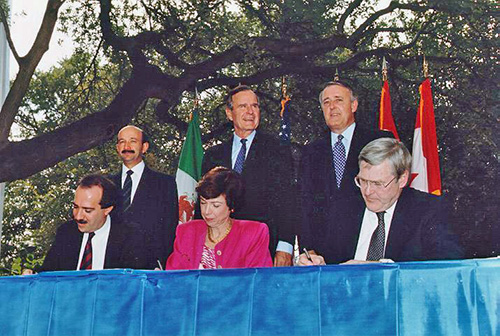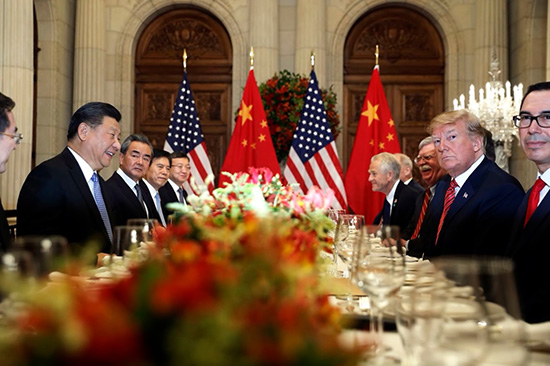Donald Trump’s dangerous economic nationalist rhetoric revolves around two central proposals: the need to remove the U.S. from the historic North American Free Trade Agreement (NAFTA), which he already conceded as inviable as we will explain herein; and to sustain a trade war with China. In his absurd vision, this will recover the traditional American industrial sector at the core of these economic-commercial exchanges, which has registered job loss in certain regions of the country.
Let’s dissect and see where both proposals have led the economy after almost two years of presidency—taking into account the events of last week’s G20 summit in Buenos Aires, Argentina.

North America’s New Trade Agreement
Trump started, in fact, separating himself from NAFTA. The negotiations concluded in a series of signatures per stage of an agreement essentially identical to what the U.S. had with Mexico and Canada. This time, barely incorporating certain scopes that the three countries had been debating and negotiating within the framework of NAFTA protocols. Trump has boasted loudly, assuring that what he achieved is the most important and largest trade agreement in history. However, the truth is that, in essence, it’s the same treaty, same market, and same actors. Mexico signed it first, and last week, in Buenos Aires, Canada announced it would be part of it. Ultimately, Trump landed an illusory pirouette: He changed everything to change nothing. To be fair, he did rename the treaty (the USMCA Trade Agreement) with the Trump stamp. In the end, it’s a demagogue and rebranding exercise—another deception on top of the multiple ones that keep his narrative afloat.
One of the central issues, of the new scope of the agreement, is the incorporation of provisions to promote the export to Mexico of a greater volume of parts for the assembly of motor vehicles, and thereby stimulate the automotive industry, mainly from Michigan. In this transit, General Motors, the automotive giant, announced the closure of plants and massive layoffs in the United States. Apparently, Trump has negotiated little enough to retain those jobs and sources of production in the terms that his policy aspired to.
Trump Halts Trade War on China
Now, let’s move on to the China trade war. After several pulse rounds, in which tariffs were increased, Trump sat with the Chinese high government in Buenos Aires and declared a cessation of the escalation of this commercial conflict for 90 days. Why? The trade war with China is the greatest uncertainty that has affected the stock markets this year, creating great volatility in the behavior of the main securities issued by US global technology companies, such as Apple. Similar is the case of its negative impact on the integration of the chains of production and markets in this sector, where the US has a significant advantage in terms of patents and the development of new technologies and services. A few months ago, faced with this uncertainty and market volatility, the Trump government maintained the 10% increase in tariffs on Chinese imports. It deferred new increases of up to 30% until January, in order to give American companies leeway to find alternatives for their supply chain and production.
This 90-day truce, which China subscribed to in Buenos Aires, seeks to prolong the imminent date for when Trump has threatened to increase tariffs again if China doesn’t accept his demands. In the end, January could arrive and Trump would still have nothing to show the markets, offering neither alternatives nor successes in his positions against China. The stock market has been affected by this fact; and, despite an initial recovery, it has returned to a volatile state given the uncertainty of what may happen in 90 days. Some think these negotiations will keep getting postponed without definitions of substance, and no corrections to the damage introduced so far. Others fear that both powers will clash commercially, bringing terrible consequences upon the global economy.

In a few words, Trump doesn’t have the slightest idea nor plan in terms of the economy to comply with his populist promise to attend the need of the working class. And while he disruptively plays with international trade, without positive effect, his presidency doesn’t advance in improving workers rights or conditions. He has done nothing, for example, to improve the minimum wage or the access to better social security for the middle and working classes in an economy which is entering its tenth year of economic growth and several of full employment (unemployment was below 4.5% during the last years of the Obama administration and now stands at 3.8%). In the last eight years, productivity gains have also increased and big corporations have accumulated extraordinary earnings. Nonetheless, these benefits haven’t been justly distributed among all factors of production, in detriment to the labor market, specially.
Definitely, Trump’s approach to international trade, as with immigration, is a great manipulation. A demagogic and populist deceit. Fortunately, the U.S. Economy has proven robust and prepared to temporarily ride the waves unquestionably upset from Trump’s improvisation. This prevents some analysts from wondering until when it will hold, particularly when one adds to the problem the significant increase in the fiscal deficit up to 3.8% of GDP (from a historical low of 2.6%) and projected at 4,4% for 2019, given the massive tax cuts introduced by the Trump administration. In fact, many think that between 2019 and 2020 we could see a downturn in the U.S economy, putting Trump on the defensive for the electoral debate. There is no shortage of those who consider that this manipulative game—of offering changes and, in the end, not making them or not going far enough—is sufficent to arrive at the elections in a relative economic welfare.
The day will come and we shall see what happens, but one thing is clear: the vital issue of the economy is being handled irresponsibly, and such actions will have very negative consequences in the medium and long term, if not sooner.
Para español lea: Por qué el nacionalismo económico de Trump está condenado al fracaso.
Nos leemos por twitter @lecumberry
